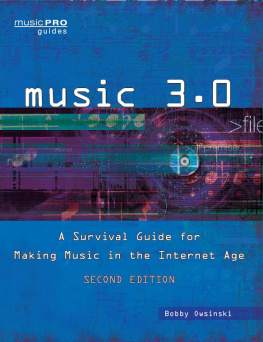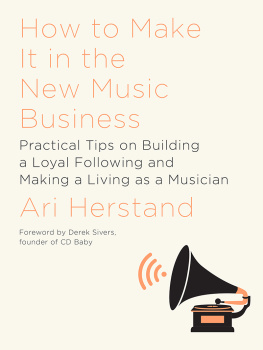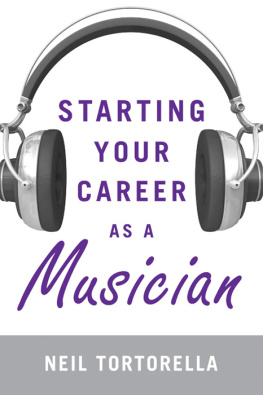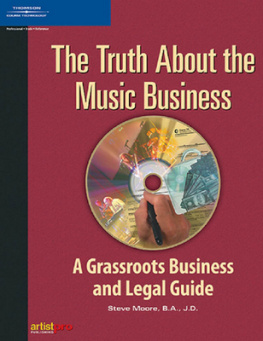Underwood John - How To Succeed in the Music Business
Here you can read online Underwood John - How To Succeed in the Music Business full text of the book (entire story) in english for free. Download pdf and epub, get meaning, cover and reviews about this ebook. City: London, year: 2008;1976, publisher: Music Sales Corp., genre: Home and family. Description of the work, (preface) as well as reviews are available. Best literature library LitArk.com created for fans of good reading and offers a wide selection of genres:
Romance novel
Science fiction
Adventure
Detective
Science
History
Home and family
Prose
Art
Politics
Computer
Non-fiction
Religion
Business
Children
Humor
Choose a favorite category and find really read worthwhile books. Enjoy immersion in the world of imagination, feel the emotions of the characters or learn something new for yourself, make an fascinating discovery.

- Book:How To Succeed in the Music Business
- Author:
- Publisher:Music Sales Corp.
- Genre:
- Year:2008;1976
- City:London
- Rating:4 / 5
- Favourites:Add to favourites
- Your mark:
- 80
- 1
- 2
- 3
- 4
- 5
How To Succeed in the Music Business: summary, description and annotation
We offer to read an annotation, description, summary or preface (depends on what the author of the book "How To Succeed in the Music Business" wrote himself). If you haven't found the necessary information about the book — write in the comments, we will try to find it.
Whether you are an established musician or just starting out, sooner or later youll have to make some vital decisions. This new edition of the bible of the music business gives you all the advice youll need.
How To Succeed in the Music Business — read online for free the complete book (whole text) full work
Below is the text of the book, divided by pages. System saving the place of the last page read, allows you to conveniently read the book "How To Succeed in the Music Business" online for free, without having to search again every time where you left off. Put a bookmark, and you can go to the page where you finished reading at any time.
Font size:
Interval:
Bookmark:
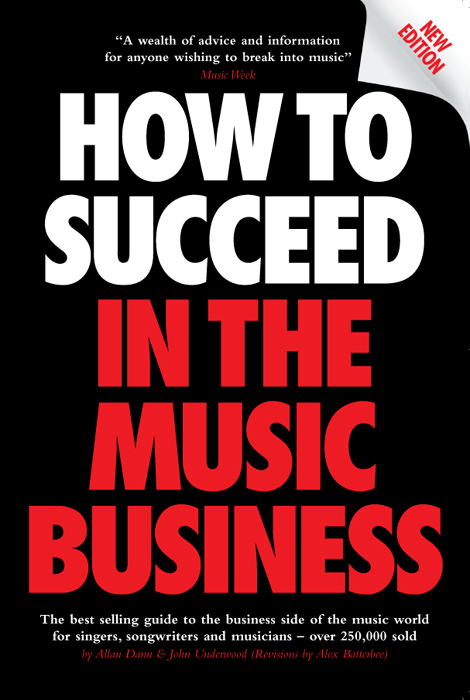
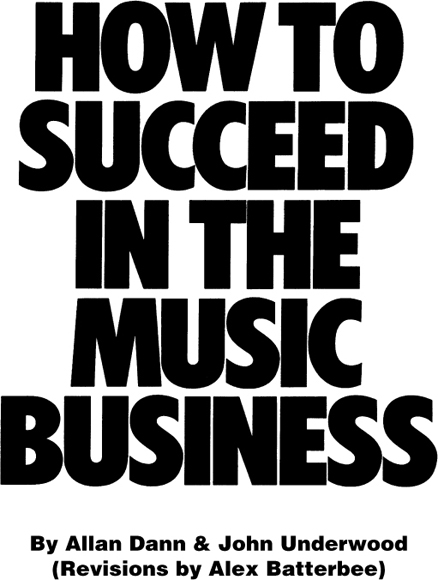
There are many big names in the music world who, despite all their apparent success, have come out of it with very little to show in the way of financial reward. The man in the street would firmly believe that they must have made a fortune, yet hasty signing of unfavourable contracts has been the downfall of many stars.
Sometimes their problems have become public knowledge, as when contractual wrangles get as far as the courts, but many more have simply not succeeded when they could have done, or have succeeded but just not made the money they should have made.
The temptation is obvious, when you first enter the business, to sign the first piece of paper thrust in front of you, just so that you can wave it about and say, Ive been signed up, Ive got a recording/publishing contract! This is especially so when often the record company or publisher appears to be doing you a huge favour by giving you a chance. The days have virtually gone when professional songwriters would sell hit songs outright for a few pounds, or important artists would make hit records for just the fee paid at the session, but it still can and does happen. The music stars who have succeeded in becoming famous AND rich, are the ones who had their heads screwed on.
This book is based on the personal experience of two professionals who between them have had more years in the music business than they care to say. It is not intended to be a definitive work on the subject (such a book would be many times this size and very difficult to read). Because of this we should stress from the outset that this book should not be solely relied upon in place of professional legal advice, for which there really is absolutely no substitute in each individual case. This book will, however, help you to find your way around the business and to know what questions to ask, and how to avoid many of the most obvious mistakes that are still, amazingly, common. It will help you to have your head screwed on in the music business.
This book doesnt presume to teach you how to write a hit song or to sing or to play your instrument (you probably dont need any guidance on this you probably already know what you can and cannot do, musically) although there are sections giving a general guide as to how you can best sell your songs to music publishers and yourself to record companies, pointing out some of the pitfalls.
You may not need to read the book cover to cover, but we strongly urge you to read thoroughly whichever of the following sections is relevant for you. These days very few writers are not also producers and very few singers are not also writers etc. so at the very least wed suggest that you skim through the headings in the other sections to see what might be relevant.
For quick reference a rough guide to royalty rates and terms offered by publishers, record companies, managers, agents etc. is included towards the back of this book.
Perhaps more than anything else for a singer or musician hoping to be a star, getting a recording contract is their greatest ambition. In the eyes of friends and relatives, once offered a contract they will already have made it. Unfortunately this may be a very long way from the truth, especially if the contract is a bad one.
It might seem to you that as the Internet comes into its own and physical products like CDs become less and less important that you dont need a record company to produce those CDs, package them and get them into shops. And you may be right. Certainly there are many websites and online music download retailers who would have you believe that this is the case. In reality, though, if you are to have any commercial success (ie. make money from your music) you will need something like a record company to do all the other things that have always been a big part of the record companys job. These things include PR, marketing, protecting your rights from pirates and people who try to use your music for free and, most importantly, collecting the money from consumers and businesses who want to listen to or use your music. If you dont have a record company to do these things for you then youll either have no time to make music or else youll need to pay for a whole team of people, equipment and a place for them all to work (ie. form your own record company). Finally, and perhaps most convincingly, the old-fashioned physical products side of the music business might be in decline from a massive high point, but there are still hundreds of millions of records being sold worldwide every year and the traditional record company has the infrastructure to get a part of that vast market for you.
The reason behind most peoples choice of record company is that they know someone who knows someone. In a business where a lot of the time its not what you know but who you know this has some merit, but if the company is unsuitable then its really a waste of time. Even the major companies have different labels, sometimes separately run and specialising in different types of material. Most of the independent labels (indies) are to some extent specialised, so aim first for one that is successful with your type of music. If, for instance, you are a dance artist, take a look at the dance records that you or your friends may already have and look to approach these companies first. The only time when this might not be advisable is if you model yourself on one particular distinctive artist. A company is less likely to be interested in signing you up if it already has an artist just like you but who is already successful; then again for the exact same reason you might be just the thing their competitors are looking for.
Unless you are very lucky then the chances are, no matter how talented you are, you will face a good deal of rejection before you get anything like a sniff of interest from a record company. If the first few dont show interest, remember youve lost nothing, and dont despair. Many famous artists, including The Beatles, were turned down by very knowledgeable and successful people in the music business before finally being signed up.
By far the best way to be discovered in this day and age is to build your following, and the buzz around your music, to the point that a record company thinks it will be able to build on that base and take you to the next level. That means getting as much exposure for your music as possible.
So if your music is the sort best heard live, then get yourself as many gigs as you can and get names and email addresses from the people who come and are interested to hear more. Then follow up and make sure those people know about future gigs.
Get yourself a website and keep it up to date with news of gigs, a blog, samples of your music, photos etc Set yourself up on Internet social networking sites such as MySpace (which offers great music-related tools). If you can, put clips from videos of your performances on YouTube or the like. The possibilities offered by the Internet are almost limitless and it can be quite daunting at first, but it can also be a very productive way to get the public and record companies to hear your music. Just remember not to spread yourself too thinly, for example by joining dozens of sites and then not having time to service them with new information. Pay attention to the feedback that you get about your sites and your music; this doesnt mean you have to follow all the advice youre given, but at least you will begin to know your audience. Also, if you put up a cover version of someone elses song, make sure that the website has the appropriate licences from the PRS (Performing Rights Society); if you plan to make money from your music, it makes sense to respect copyright laws.
Font size:
Interval:
Bookmark:
Similar books «How To Succeed in the Music Business»
Look at similar books to How To Succeed in the Music Business. We have selected literature similar in name and meaning in the hope of providing readers with more options to find new, interesting, not yet read works.
Discussion, reviews of the book How To Succeed in the Music Business and just readers' own opinions. Leave your comments, write what you think about the work, its meaning or the main characters. Specify what exactly you liked and what you didn't like, and why you think so.

